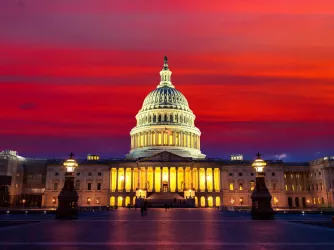Table of Contents
Getting It Right: Dean of George Mason Law Sets Excellent Example
All too often here at FIRE, we find ourselves up to our necks in campus censorship. For example, in just the last few weeks, we've seen a professor threatened by campus police for posting a sci-fi quote and a coalition of student groups silenced by a professor who didn't like their free speech wall. Of course, FIRE fights hard to correct these wrongs. But sometimes the constant stream of rights violations on campus gets a little depressing, to be honest.
So that's why it's a real pleasure to come across a sterling example of how a school should react when confronted with a question about campus speech.
Here's the background, quickly: Recently, two student groups at George Mason University School of Law, the Federalist Society and the Jewish Law Students Association, have taken heat for inviting controversial activist Nonie Darwish to campus for a lecture. Specifically, the Council on American-Islamic Relations called on the school to disinvite Darwish because of her past statements regarding Islam. (Above the Law has more.)
So what happened next? Did GMU cancel the speech, as other institutions have done when faced with calls for disinvitations of unpopular or controversial speakers? Did it impose heavy security fees on the student groups, a sadly common tactic for campus censors looking to silence outside speakers?
No. Instead, GMU School of Law Dean Daniel Polsby got it exactly right. In a statement sent to students and faculty late last week, Polsby issued a stirring defense of free speech on campus.
I'm very pleased to reprint his statement in full:
It appears that there is need to clarify the policy affecting speakers at the law school.
Student organizations are allocated budget by the Student Bar Association in order to allow them, among other things, to bring speakers to the law school. Neither the law school nor the university can be taken to endorse such speakers or what they say. Law school administration is not consulted about these invitations, nor should we be. Sometimes speakers are invited who are known to espouse controversial points of view. So be it. So long as they are here, they are free to say whatever is on their mind within the bounds of law. They cannot be silenced and they will not be.
Just as speakers are free to speak, protesters are free to protest. They must do so in a place and in a manner that respects the rights of speakers to speak and listeners to listen, and that is in all other ways consistent with the educational mission of the university. Student organizations which hold contrary points of view have every right to schedule their own programs with their own speakers, and these speakers' rights will be protected in just the same way.
The law school will not exercise editorial control over the words of speakers invited by student organizations, nor will we take responsibility for them, nor will we endorse or condemn them. There has to be a place in the world where controversial ideas and points of view are aired out and given space. This is that place.
Daniel D. Polsby
Professor of Law, Dean
FIRE couldn't have said it any better. Every public college administrator in the country should read Dean Polsby's words—and follow his example.
Recent Articles
FIRE’s award-winning Newsdesk covers the free speech news you need to stay informed.

One day after FIRE lawsuit, Congress passes changes to filming permits in national parks

VICTORY: FIRE lawsuit leads California to halt law penalizing reporters, advocates, and victims who discuss publicly known information about sealed arrest records

O holy fight: New Hampshire Satanic Temple statue threatened by more than vandals
